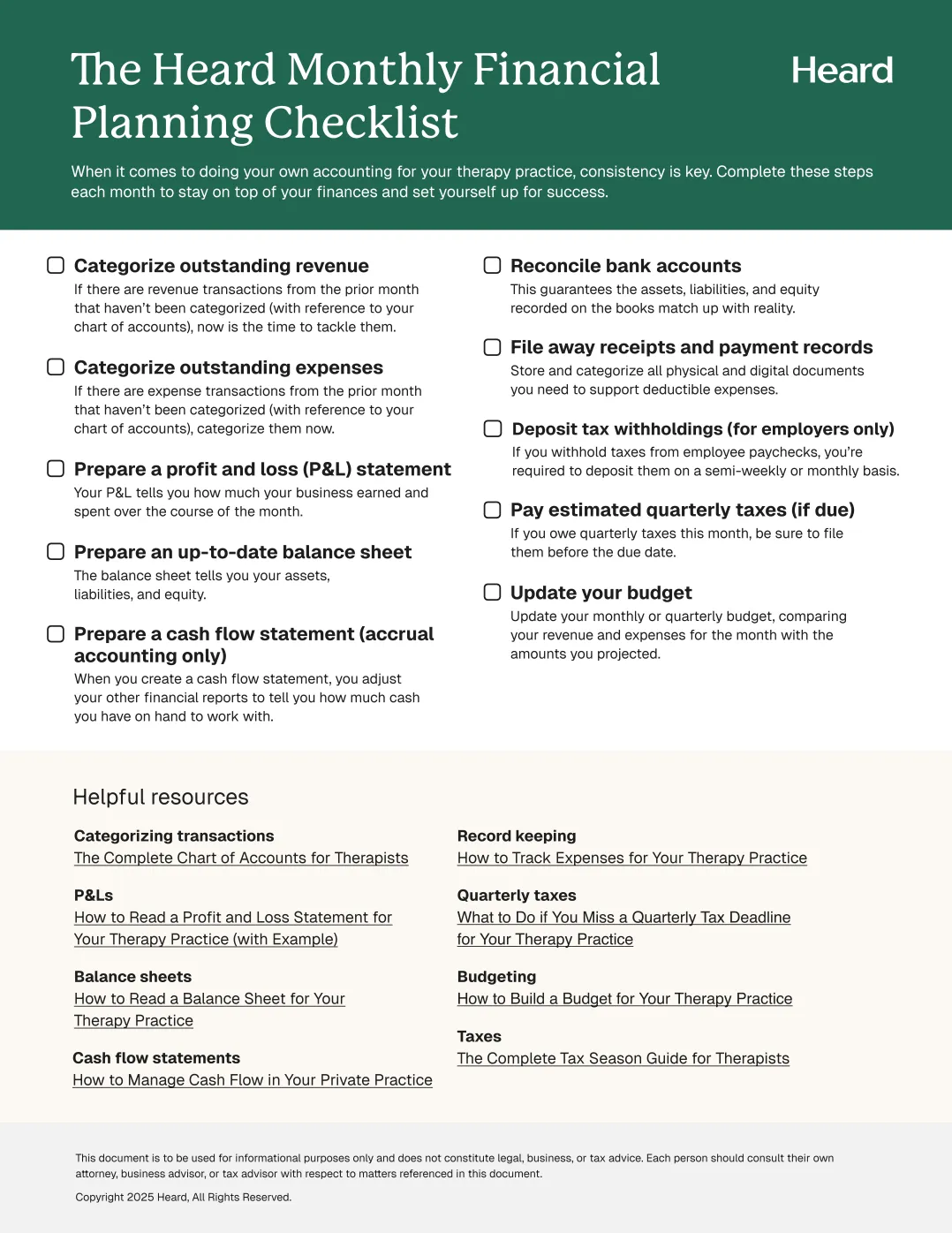Investing in professional help to manage the financial side of your therapy practice can have a huge payoff. Not only do bookkeepers and accountants ensure you accurately track your finances and file your taxes, but they can free up time and energy to devote to your clients.
There are four types of financial professionals to turn to when you need help:
- Bookkeepers
- Accountants
- Certified public accountants (CPAs)
- Enrolled agents (EAs)
Here’s what each one does, and how to choose (and hire) the right professional for your therapy practice.
{{resource}}
Bookkeepers and your therapy practice
Bookkeepers track your day-to-day business transactions and prepare the information so you (or your accountant) can use it to file taxes.
What a bookkeeper can do for your therapy practice
Every time your therapy practice spends or earns money, your bookkeeper makes a record of it. These records are kept in your general ledger, organized into different accounts (also called ledgers).
Your bookkeeper may prepare financial reports for your therapy practice, which you can use to make business decisions and file your taxes. In some cases, your bookkeeper may deliver your general ledger to your accountant, who then prepares your financial reports like your balance sheet and your profit and loss statement (P&L).
By tracking your transactions and preparing reports, a bookkeeper gives you insight into how your therapy practice is running, and what steps you may need to take to keep it financially healthy.
Bookkeeper qualifications
Virtually anyone can start a bookkeeping business and advertise themselves as a bookkeeper. They don’t need a license or any other type of certification.
However, for the sake of building trust, many bookkeepers opt to apply for a certified bookkeeping professional (CPB) or certified bookkeeper (CB) designation.
The CPB designation is managed by the National Association of Certified Public Bookkeepers (NACPB), while the CB designation is managed by the American Institute of Public Bookkeepers (AIPB). To qualify for either, an individual must work as a bookkeeper for a minimum number of hours and pass a certification exam.
How to work with a bookkeeper
In order to categorize your transactions—sorting them into different accounts—and record them in the general ledger, your bookkeeper needs information on how you use your money.
- How much you spend, and when
- How much you earn, and when
In the past, you’d provide this information in the form of a daybook, a kind of “rough draft” of accounts, where you’d write down information about each transaction. Today, the job is made much easier with software.
Most bookkeepers use software to track their clients’ transactions. On the client end, you install the software and set it up to synchronize with your business checking and credit card accounts.
Transactions from those accounts are automatically imported into the app, and from there you can sync them with the general ledger managed by your bookkeeper. Your bookkeeper categorizes the transactions and enters them in your general ledger.
Your bookkeeper may then use the information in your ledger to create monthly or quarterly financial reports, as well end-of-year reports, that summarize your financial activity. You can use this information to file your taxes.
How much does it cost to hire a bookkeeper?
Bookkeepers typically charge based on how many hours per month they need to spend working on your books. As a result, the more complex your therapy practice’s financials are, the more bookkeeping is likely to cost.
For instance, if you only have half a dozen transactions per week—say, a few payments from clients, plus one or two bills or loan payments—the cost of bookkeeping may be relatively inexpensive.
On the other hand, if you have twenty-five transactions per week—money coming in from clients, plus expenses related to running an office and paying employees—your bookkeeping will cost you more.
When you work with Heard, you pay a flat monthly rate for bookkeeping and accounting services.
How to hire a bookkeeper for your therapy practice
When hiring a bookkeeper for your therapy practice, you can turn either to an individual freelancer or a firm.
Freelance bookkeepers
Freelancers have a wide range of levels of experience. Thanks to accounting software and online freelancing sites like Upwork, it’s possible to hire a bookkeeper just about anywhere in the world. You can also likely find a freelancer in your own community who is up to the task.
Before hiring a freelance bookkeeper, find out whether they’ve worked with therapy practices in the past; if they’re already familiar with how a therapy practice operates, it may take them less time to set up your chart of accounts and get the hang of how your transactions should be categorized.
Bookkeeping firms
In contrast to single-bookkeeper freelance operations, larger bookkeeping and accounting firms may employ many bookkeepers, all of which typically need to meet certain minimum requirements to work there. A large bookkeeping firm may cost less than a local freelancer, but they may not have industry-specific experience when it comes to therapy practices.
Heard exclusively works with therapists who run their own practices.
{{resource}}
Accountants and your therapy practice
Accountants help you file taxes and make major business decisions based on data compiled by your bookkeeper
What an accountant can do for your therapy practice
When you hire an accountant for your therapy practice, they can:
- Prepare and file your tax return for you. Some small business owners consult with their accountant throughout the year for business advice. Others only see them during tax season, when it’s time to file.
- Provide guidance and advice. Your accountant can help you identify ways to save money—for instance, by identifying and reporting deductible expenses, or by helping you choose a business structure. They can advise you on tasks like setting up payroll or applying for business loans and lines of credit.
- Plan for the future. An accountant can help you build and balance a budget for your therapy practice, create financial projections, and plan for growth.
Accountant qualifications
In order to work as an accountant, an individual needs, at minimum, a bachelor’s degree in accounting.
A bachelor’s degree provides an accountant with the fundamentals they need to handle accounting tasks for individuals and businesses, while complying with Generally Accepted Accounting Principles (GAAP).
Many accountants seek additional certifications. The most common certifications for accountants are:
- Certified Public Accountant (CPA)
- Enrolled Agent (EA)
- Certified Internal Auditor (CIA)
- Certified Financial Analyst (CFA)
- Certified Fraud Examiner (CFE)
- Certified Management Accountant (CMA)
Two of these—CPAs and EAs—are covered below.
How to work with an accountant
How you end up working with an accountant depends upon the needs of your therapy practice.
If you’re the only person working at your therapy practice, your accounting needs may be straightforward. In that case, you may only meet with your accountant at tax time to have them file your taxes for you.
On the other hand, if you have employees or contractors, or you share ownership of your practice with other therapists, you may employ an accountant on an ongoing basis. They can generate financial statements for you and help analyze them, so you can track your business’s many different moving parts.
Finally, you may hire an accountant to guide you through a particular challenge. Many small business owners hire accountants to help them incorporate their company, prepare it for sale, bring on partners, or apply for business loans and lines of credit.
How much does it cost to hire an accountant?
How much you pay for an accountant depends upon the needs of your business.
For instance, a sole proprietor with a non-itemized tax return could expect to pay something like $279 to have their taxes filed, while an itemized tax return for the same sole proprietor would cost $392 (on average). As soon as that sole proprietor incorporates, their annual tax return starts costing closer to $1,000.
You can find a full breakdown of average accounting fees in the 2023 NSA income and fees survey.
How to hire an accountant for your therapy practice
Similarly to working with a bookkeeper, you may hire an accountant who is self-employed or one who is an employee at an accounting firm.
Large accounting firms like H&R Block provide one-stop accounting services at tax time for small businesses. It’s a popular choice for many small business owners or individuals who need help filing their taxes.
However, accountants at large firms aren’t guaranteed to have experience serving therapy practices, and may not be familiar with certain tax deductions—such as the cost of HIPAA-compliant software and payment processors, or therapeutic tools—common for therapists.
Other accountants are self-employed, working as individual freelancers or sharing their firm as partners with other accountants. They may be able to provide more personalized services than a large accounting firm, and may have experience working with therapy practices. They’re a better choice if you want to build a long-term relationship with your accountant.
The tradeoff is that hiring a smaller firm or individual may cost more than working with a one-stop accounting service like H&R Block.
Heard handles bookkeeping, accounting, and taxes exclusively for therapy practices for one flat monthly rate.
{{resource}}
Certified Public Accountants (CPAs) and your therapy practice
A CPA is an accountant who has achieved an extra level of certification with accounting authorities in your state; all CPAs are accountants, but not all accountants are CPAs.
What a CPA can do for your therapy practice
A CPA can perform any task typically handled by a non-CPA accountant, including generating and analyzing financial reports and preparing your taxes.
Importantly, a CPA is legally permitted to represent you in dealings with the IRS. Those could take the form of negotiating lower tax penalties or amending past tax returns. A CPA can also product certified financial statements, which banks typically require when considering your application for a loan.
According to the 2023 NSA income and fees survey, 36% of respondents were CPAs.
CPA qualifications
A CPA is registered with the Board of Accountancy in the state where they operate. In order to become licensed as a CPA, an accountant must meet the following requirements:
- Education: A bachelor’s degree or higher in accounting, finance, or business administration, totalling 150 credit hours (including 24 semester hours in accounting).
- Experience: At least one year (in some jurisdictions, two) working under a licensed CPA.
- Examination: To become a CPA, an accountant must pass the Uniform CPA Exam.
In addition, a CPA is required to pursue continuing education in regulatory review and ethics.
How to work with a CPA
Working with a CPA is identical to working with an accountant—a CPA is simply an accountant with an added designation.
How much does it cost to hire a CPA?
For the most part, you can expect the cost of hiring a CPA to be within the same range of hiring an individual, non-CPA accountant.
How to hire a CPA for your therapy practice
Hiring with a CPA is identical to hiring an accountant—a CPA is simply an accountant with an added designation.
{{resource}}
Enrolled Agents (EAs) and your therapy practice
EAs are accountants who are certified by the IRS to represent individuals and businesses dealing directly with federal tax authorities; their work is focused almost entirely on taxes rather than day-to-day accounting.
What an EA can do for your therapy practice
An EA is federally authorized to help any individual or business with anything to do with their taxes. They also have the privilege of confidentiality: When an enrolled agent represents you before the IRS in matters involving audits and collections, information you share with them remains confidential.
An enrolled agent can help your therapy practice:
- Navigate complex tax laws
- Represent you in dealings with the IRS
- Prepare, sign, and file your tax return
- Help you plan how you’ll file and pay your taxes
- Assist you with any other tax-related tasks
An EA is not the best professional to hire if you need help with other accounting matters—such as incorporating your practice, planning to sell it or bring on investors, or building a budget. For that, you’re better off talking to a CPA.
EA qualifications
EAs are licensed at the federal level, not the state level (as with CPAs).
In the words of the National Association of Enrolled Agents NAEA):
Only enrolled agents are required to demonstrate to the IRS their competence in all areas of taxation, representation and ethics before they are awarded unlimited representation rights to represent taxpayers before the IRS.
To become certified, an EA must either:
- Pass the Special Enrollment Examination (SEE), and pursue continuing education in order to maintain their certification (72 hours of education every three years).
- Work for the IRS for at least five years, in which case they may not need to take the SEE. While many enrolled agents are former IRS employees, current IRS employees may not be enrolled agents.
How to work with an EA
Business owners typically only hire EAs when they’re in need of help filing their taxes or when they’re seeking someone to represent them in dealings with the IRS. It’s typically a short-term relationship—unless you’re in a serious tangle with tax authorities, it’s unlikely you would hire an EA on an ongoing basis—that ends once the issue is resolved.
How much does it cost to hire an EA?
EAs typically charge $200 – $400 per hour. Before hiring an enrolled agent, get a quote based on how much time they expect it will take to handle your case.
How to hire an EA for your therapy practice
To hire an enrolled agent, visit the NAEA’s online directory.
The IRS recommends you check with the Better Business Bureau (BBB) before hiring an enrolled agent. If you’re unsure whether an EA is qualified, you can email their full name, address (if available), and EA number (if available) to epp@irs.gov for confirmation.
—
Learn more about how to hire an accountant for your therapy practice.
This post is to be used for informational purposes only and does not constitute legal, business, or tax advice. Each person should consult their own attorney, business advisor, or tax advisor with respect to matters referenced in this post.
Bryce Warnes is a West Coast writer specializing in small business finances.
{{cta}}
Manage your bookkeeping, taxes, and payroll—all in one place.

Discover more. Get our newsletter.
Get free articles, guides, and tools developed by our experts to help you understand and manage your private practice finances.
Every therapist who joins Heard is supported by a team of accountants, CPAs, payroll specialists, and bookkeepers who specialize in therapy practices. Schedule a free consult to learn more.
Schedule a free consult




